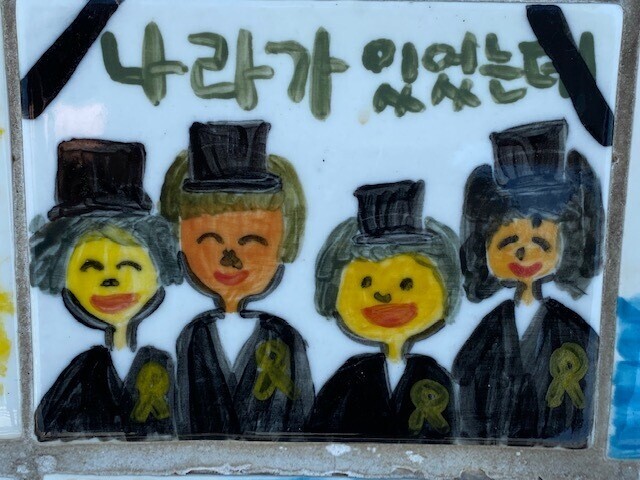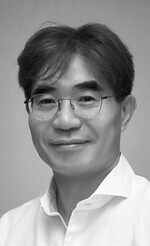hankyoreh
Links to other country sites 다른 나라 사이트 링크
[Guest essay] Korea’s absent state and backsliding democracy


By Kwon Hyeok-yong, professor of political science at Korea University
Publishing a photograph of the deadly Oct. 29 Itaewon crowd crush on its front page, the New York Times described the tragedy as “absolutely avoidable.” In this case, the party that failed to “avoid” it was the government — the state.
At the seawall in Jindo’s Paengmok Harbor, there is a tile wall of paintings by students from throughout South Korea. One of those paintings bears the words, “The state was there, and yet…”
The Itaewon tragedy and the state’s conspicuous absence when it was taking place bear many connections with the backsliding of South Korea’s democracy.
The political scientist Nancy Bermeo describes “democratic backsliding” as a phenomenon in which lawfully elected leaders use democratic means to chip away at the values, norms, and operating principles of democracy.
Some of the most characteristic manifestations include the expansion of executive powers and harassment of opposition parties. Practitioners have weakened the legislatures and judiciaries that might check their arbitrary exercise of executive authority, while actively adopting a “manual” in which their political rivals are framed as “corrupt” or “malicious” and subjected to investigation and indictment.
At the moment, the administration of South Korean President Yoon Suk-yeol is single-mindedly focused on harassing its political opposition, making use of coercive state institutions such as the police, prosecutors, and the Board of Audit and Inspection (BAI).
In the US, Donald Trump spent the entire first year of his term working to undo the achievements of his predecessor Barack Obama’s administration. The Yoon administration seems to be doing more or less the same thing: the constant stories about the president and the denunciations of the Moon Jae-in administration and the undoing of its policies.
Even as it uses the police, prosecutors, BAI, and other state institutions to harass the opposition, the administration appears to have decided not to send the authorities to investigate cases such as the manipulation of Deutsch Motors stock prices. Sometimes, there’s an even greater power in doing “nothing” rather than doing something.
The Yoon administration’s People Power Party has put in place a leadership consisting of presidential loyalists, while previous leaders like Yoo Seong-min have found themselves shut out — systematically, meticulously, and all in line with “lawful procedure.”
In addition, it has been using enforcement decrees as a way of neutralizing the aims of laws enacted by the National Assembly, where the opposition Democratic Party holds a majority. A representative example of this is the legislation adjusting the investigation powers of the police and prosecutors; the administration is also pushing to amend an enforcement decree to circumvent the Serious Accident Punishment Act.
The same kind of governing through the equivalent of enforcement decrees has also been seen in the US. Political scientists Andrew Reeves and Jon Rogowski have observed that this approach is supported neither by a majority of voters nor even by the voters who happen to support the president in question. Methods that sidestep the legislature are not seen as democratically legitimate.
South Korea’s democracy has been backsliding. State authority is wielded selectively, while the state neglects the duties that it should be responsible for. The powers of the state are being used to gradually lay waste to constitutionalism and liberal democracy, both of which rely crucially on the separation of powers and a system of checks and balances.
“Freedom” is one of Yoon’s pet words, but a core part of “freedom” lies in protecting the public from the arbitrary exercise of state authority. That’s what the “liberal” part of “liberal democracy” means. When the minister of culture, sports and tourism issued a “stern warning” over a high school student’s satirical political cartoon of the “Yoon Suk-yeol train,” this was a stern warning against freedom and liberalism.
A democratic political system is a system of responsibility. One form of that is “horizontal accountability,” where executive authorities are accountable for checking the legislative and judicial branches. Another is “vertical accountability,” which means assuming accountability for voters and the public in general.
But for the Yoon administration, the very concept of “assuming accountability” for the legislative branch does not appear to exist. And we don’t see any signs of it being accountable to voters or the public either.
The political scientist Daniele Caramani named “populism” and “technocracy” two major threats to contemporary democracy.
The reason an expert technocracy can still pose a threat to democracy even when it is trusted by the public stems from the fact that as a group, it views itself as merely responsible for presenting results to those in power and being judged on that basis — while seeing no reason to respond to the public’s demands or popular will.
But as the political scientist Robert Dahl observed, democracy is a system in which the government is continually responding to the demands of a politically equal citizenry.
A “legal expert” minister of the interior and safety who is a former judge; a “legal expert” minister of justice who is a former prosecutor and now argues a juridical basis for the enforcement decree-based governing approach; a “legal expert” presidential office staffer who started out with the prosecutors and was selected to a key position of power despite being criticized by the Supreme Court for their abuse of authority in “retaliatory indictments”; an “economic expert” prime minister who is a living icon of government-business collusion; and a president who styles himself as an “expert in corruption investigations.”
A look at this lineup suggests that the technocracy threat in South Korea has already become a reality.
As technocrats who have failed to fulfill their official duties and responsibilities — for the disaster, for the victims, for the failure to protect the public’s lives and safety — they have no understanding of the basic principles of democracy, which assigns responsibility to them.
It is because people like this are in power now that South Korea’s democracy is backsliding.
Please direct questions or comments to [english@hani.co.kr]

Editorial・opinion
![[Column] Park Geun-hye déjà vu in Yoon Suk-yeol [Column] Park Geun-hye déjà vu in Yoon Suk-yeol](https://flexible.img.hani.co.kr/flexible/normal/500/300/imgdb/original/2024/0424/651713945113788.jpg) [Column] Park Geun-hye déjà vu in Yoon Suk-yeol
[Column] Park Geun-hye déjà vu in Yoon Suk-yeol![[Editorial] New weight of N. Korea’s nuclear threats makes dialogue all the more urgent [Editorial] New weight of N. Korea’s nuclear threats makes dialogue all the more urgent](https://flexible.img.hani.co.kr/flexible/normal/500/300/imgdb/original/2024/0424/7317139454662664.jpg) [Editorial] New weight of N. Korea’s nuclear threats makes dialogue all the more urgent
[Editorial] New weight of N. Korea’s nuclear threats makes dialogue all the more urgent- [Guest essay] The real reason Korea’s new right wants to dub Rhee a founding father
- [Column] ‘Choson’: Is it time we start referring to N. Korea in its own terms?
- [Editorial] Japan’s rewriting of history with Korea has gone too far
- [Column] The president’s questionable capacity for dialogue
- [Column] Are chaebol firms just pizza pies for families to divvy up as they please?
- [Column] Has Korea, too, crossed the Rubicon on China?
- [Correspondent’s column] In Japan’s alliance with US, echoes of its past alliances with UK
- [Editorial] Does Yoon think the Korean public is wrong?
Most viewed articles
- 1‘We must say no’: Seoul defense chief on Korean, USFK involvement in hypothetical Taiwan crisis
- 2Will NewJeans end up collateral damage in internal feud at K-pop juggernaut Hybe?
- 3[Column] Park Geun-hye déjà vu in Yoon Suk-yeol
- 4Why Korea shouldn’t welcome Japan’s newly beefed up defense cooperation with US
- 5Thursday to mark start of resignations by senior doctors amid standoff with government
- 6N. Korean hackers breached 10 defense contractors in South for months, police say
- 7[Guest essay] The real reason Korea’s new right wants to dub Rhee a founding father
- 8[Column] ‘Choson’: Is it time we start referring to N. Korea in its own terms?
- 9Kim Jong-un expressed ‘satisfaction’ with nuclear counterstrike drill directed at South
- 10[Editorial] New weight of N. Korea’s nuclear threats makes dialogue all the more urgent